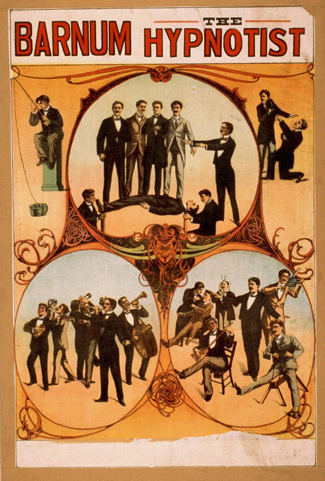| << Chapter < Page | Chapter >> Page > |
Our states of consciousness change as we move from wakefulness to sleep. We also alter our consciousness through the use of various psychoactive drugs. This final section will consider hypnotic and meditative states as additional examples of altered states of consciousness experienced by some individuals.
Hypnosis is a state of extreme self-focus and attention in which minimal attention is given to external stimuli. In the therapeutic setting, a clinician may use relaxation and suggestion in an attempt to alter the thoughts and perceptions of a patient. Hypnosis has also been used to draw out information believed to be buried deeply in someone’s memory. For individuals who are especially open to the power of suggestion, hypnosis can prove to be a very effective technique, and brain imaging studies have demonstrated that hypnotic states are associated with global changes in brain functioning (Del Casale et al., 2012; Guldenmund, Vanhaudenhuyse, Boly, Laureys,&Soddu, 2012).
Historically, hypnosis has been viewed with some suspicion because of its portrayal in popular media and entertainment ( [link] ). Therefore, it is important to make a distinction between hypnosis as an empirically based therapeutic approach versus as a form of entertainment. Contrary to popular belief, individuals undergoing hypnosis usually have clear memories of the hypnotic experience and are in control of their own behaviors. While hypnosis may be useful in enhancing memory or a skill, such enhancements are very modest in nature (Raz, 2011).

How exactly does a hypnotist bring a participant to a state of hypnosis? While there are variations, there are four parts that appear consistent in bringing people into the state of suggestibility associated with hypnosis (National Research Council, 1994). These components include:
These steps are conducive to being open to the heightened suggestibility of hypnosis.
People vary in terms of their ability to be hypnotized, but a review of available research suggests that most people are at least moderately hypnotizable (Kihlstrom, 2013). Hypnosis in conjunction with other techniques is used for a variety of therapeutic purposes and has shown to be at least somewhat effective for pain management, treatment of depression and anxiety, smoking cessation, and weight loss (Alladin, 2012; Elkins, Johnson,&Fisher, 2012; Golden, 2012; Montgomery, Schnur,&Kravits, 2012).
Some scientists are working to determine whether the power of suggestion can affect cognitive processes such as learning, with a view to using hypnosis in educational settings (Wark, 2011). Furthermore, there is some evidence that hypnosis can alter processes that were once thought to be automatic and outside the purview of voluntary control, such as reading (Lifshitz, Aubert Bonn, Fischer, Kashem,&Raz, 2013; Raz, Shapiro, Fan,&Posner, 2002). However, it should be noted that others have suggested that the automaticity of these processes remains intact (Augustinova&Ferrand, 2012).

Notification Switch
Would you like to follow the 'Psychology' conversation and receive update notifications?